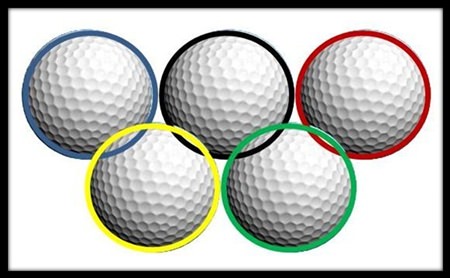“Golf at the Olympics is basically an exhibition. It doesn’t belong there. It’s gotten away from where it started” – Adam Scott speaking at the Wells Fargo Championship in May 2015. He is so right.
Scott is a firm believer that winning an Olympic gold medal should represent the pinnacle of achievement for that sport, and not, as in the case of golf or tennis, be nothing more than an exhibition, an afterthought.
“Most athletes at the Olympics have probably trained for years specifically to peak for this one event,” Scott said. “It’s the pinnacle of their sport. They get one crack at their big thing every four years. They have put their life on hold for this event. It’s so important to them; I feel it’s their time. It’s hardly ours.”
 August 2016 sees the return of Golf to the Olympic Games.
August 2016 sees the return of Golf to the Olympic Games.
The 2013 Masters Champion went on, “Whether I win an Olympic medal or not is not going to define my career or change whether I’ve fulfilled my career,” he continued. “It’s nothing I’ve ever aspired to do and I don’t think I ever will. It’s all about the four majors and I think that’s the way it should stay for golf. Golf doesn’t need to be in the Olympics.”
Good on you, Adam Scott. Your comments are spot-on.
At the International Olympic Committee Executive Session, in October 2009 in Copenhagen, golf was voted in as one of the new sports on the Olympic Programme after having been absent since the 1904 Olympics in St. Louis, USA.
In preparation for this bid, the World Amateur Golf Council changed its name in 2003 to the International Golf Federation (IGF) and became the world governing body for golf.
Prior to this, the World Amateur Golf Council was mainly concerned with arranging international amateur competitions such as the Eisenhower Trophy for men and the Espirito Santo Trophy for women. But with inclusion into the Olympics came the need for compliance with IOC requirements such as the one stating each sport must have one governing body – world-wide. Thus the IGF was formed.
The IGF Board comprises nine members plus two ex officio members in the form of the IGF President and IGF Vice President. The nine members include representatives from each of the three major tours – The PGA, European and LPGA Tours – plus the PGA of America. The remaining members presumably represent non-professional golf. Unfortunately for those who put sport before financial gain, those representing professional golf have won.
Golf and the Olympics have missed a great opportunity. Unlike many other sports, the distinction between amateur and professional golf is clearly defined within the Rules of golf. Here was an opportunity for teams of amateur golfers to represent their countries in a proven format such as the long-running Eisenhower Trophy. The Olympics is about representing one’s country. Whether the format is stroke or match play, it should at least be about teams; teams representing the golfer’s country of origin. So, would there be any chance of using a team-focused format for the Olympics, one wondered?
Underdogs winning do not increase US TV ratings as much as high-profile American golfers doing well and the former wouldn’t please the IOC’s major sponsors.
As a result of the IOC’s requirement for golf’s top names, the format the IGF came up with threatens to be the biggest yawn a major golf event has known. The format the IGF proposed to the IOC was, wait for it, a 72-hole individual stroke play competition for both men and women.
So, there you have it; yet another individual 72-hole stroke play event. Wow, awe-inspiring, overwhelming, breathtaking. Such insightfulness. I can’t wait.
But it gets worse. The IOC restricted the IGF format to a field of 60 players for each competition. It was intended that each country be represented by two golfers, whose eligibility would be determined by the official world golf rankings, with a few exceptions.
In keeping with sponsor desires for high-profile names, the IOC suggested another exception; all the top-15 world-ranked players will be eligible to compete, with a limit of four players from one country. Beyond the world top-15, players will be eligible based on a maximum of two from each country that does not already have two or more players among the top-15.
Put another way, if selection took place this week, the US Team would include Jordan Spieth, Bubba Watson, Jim Furyk and Rickie Fowler. Missing out would be Dustin Johnson, Jimmy Walker, JB Holmes and Patrick Reed, all ranked in the world’s top-15, but not as high as the first four. Ironically, the two biggest names in US golf, they who drive TV ratings, Tiger and Phil, would not be selected.
And equity? What of the fairness that sees the US get four players into a tournament where every other country will have a maximum of two? A similar situation applies to the women where the US and South Korea both have more than four players in the top 15. It is possible that half the field in either event, will be ranked outside the top 100. An even playing field it is not.
Some sports, golf included, offer a level of financial reward that is nothing short of obscene (FedEx Cup). It would have been nice to have celebrated an Olympic sporting achievement that was first and foremost a sporting success, and not a financial one. Dollars first, sport second.
Golfnutter




